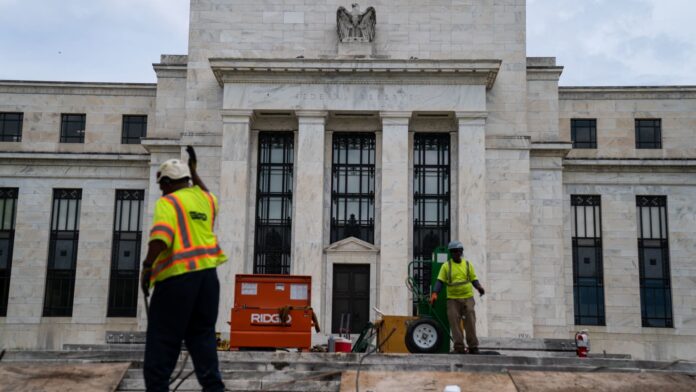The U.S. and multiple other countries face the gloomy prospects of recession ahead as global central banks raise interest rates to battle inflation, according to Bank of America. In a process the bank calls “synchronized monetary policy tightening,” the Federal Reserve, the European Central Bank and their counterparts are willing to sacrifice growth to bring down inflation that has rattled the global economy for more than a year. All totaled, 29 out of 34, or 85%, of major central banks are “tightening now and they are tightening thick and fast,” Bank of America said in a client note. Dozens of indicators and trackers the bank follows, covering areas as diverse as industrial momentum and trucking freight in the U.S. and even white liquor sales in China, already “depict a grim outlook for global growth.” Bank of America’s analysts expect the U.S., Europe, Japan and the U.K. to see a “mild recession.” “Unfortunately, the policy setup is not conducive to a turnaround in growth prospects anytime soon,” they wrote. “In fact, keeping in mind that Fed tightening cycles, more often than not, end in recessions, it is likely that things take a turn for the worse.” For investors, that means taking cover in defensive sectors that do well in downturns. The bank said that “one of the most aggressive tightening episodes in history” is sending warning signs “that appear to be at odds with segments of the investment community which expects a soft landing.” The report comes a little more than a week before the Fed is expected to approve a third consecutive 0.75 percentage point interest rate increase that would take benchmark rates up to a range of 3%-3.25%. Last week, the ECB also voted to raise rates three-quarters of a point while policymakers insisted that they don’t expect the tightening to result in a recession. Others on Wall Street also are sounding the alarm of what too much tightening will do. In their weekly market commentary, BlackRock strategists said the ECB in particular “isn’t acknowledging how it will crush activity further by trying to fight high inflation, in our view. We think the ECB will wake up to this reality sooner than markets expect – but not before it inevitably faces a severe recession.” Bank of America’s analysts also said they think investors are being too sanguine about the ramifications of central bank policy. Low rates and asset purchases known as quantitative easing helped backstop financial markets during the pandemic fallout, while the reversal of those policies has coincided with a sharp downdraft. The Fed in September stepped up its balance sheet runoff to a maximum $95 billion a month, which Bank of America estimated to equal about a 0.15 percentage point hike each month. “Not only are growth indicators steadfast on a persistent downtrend, the hawkish stance of central banks will sustain the downward pressure on the global growth trajectory, with no inflection in sight,” the bank said. “And if we do end up in a recession, remember markets have never bottomed before the start of a recession.” Bank of America is advising clients to stick with defensive sectors as the risk of a policy mistake — central banks raising rates even as inflation cools — rises continuously.
© heardonwallstreet.com


